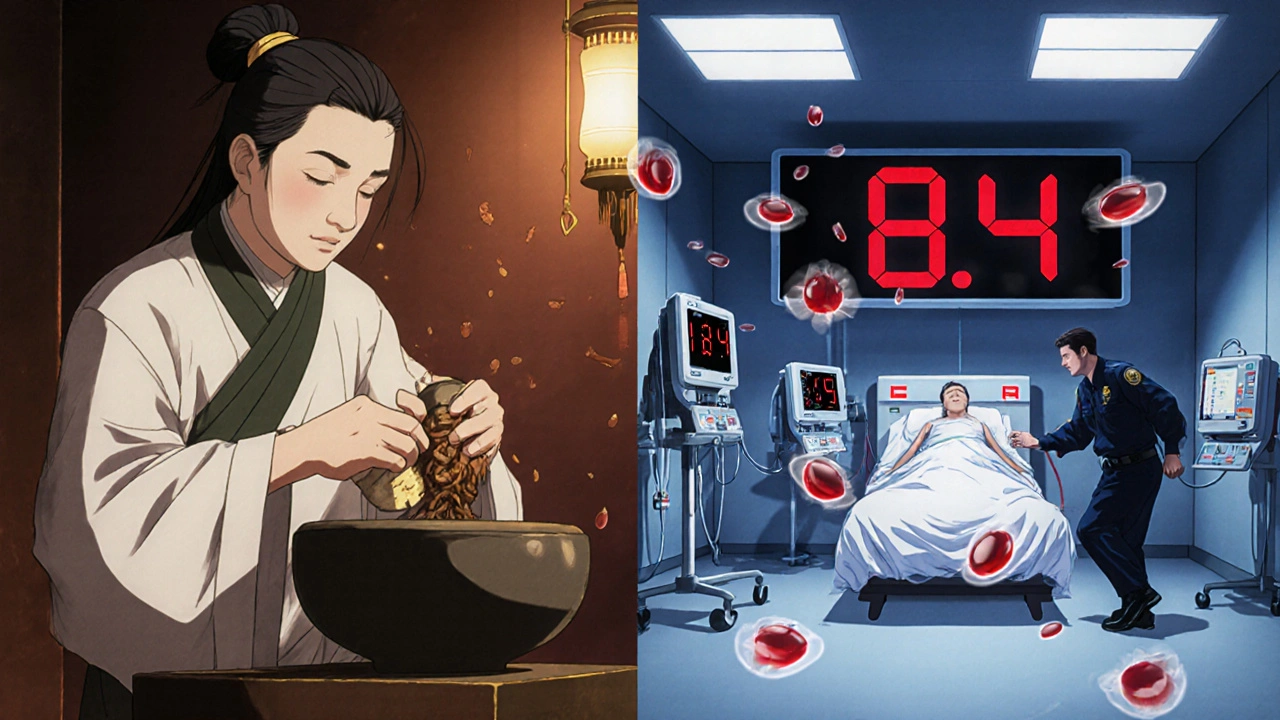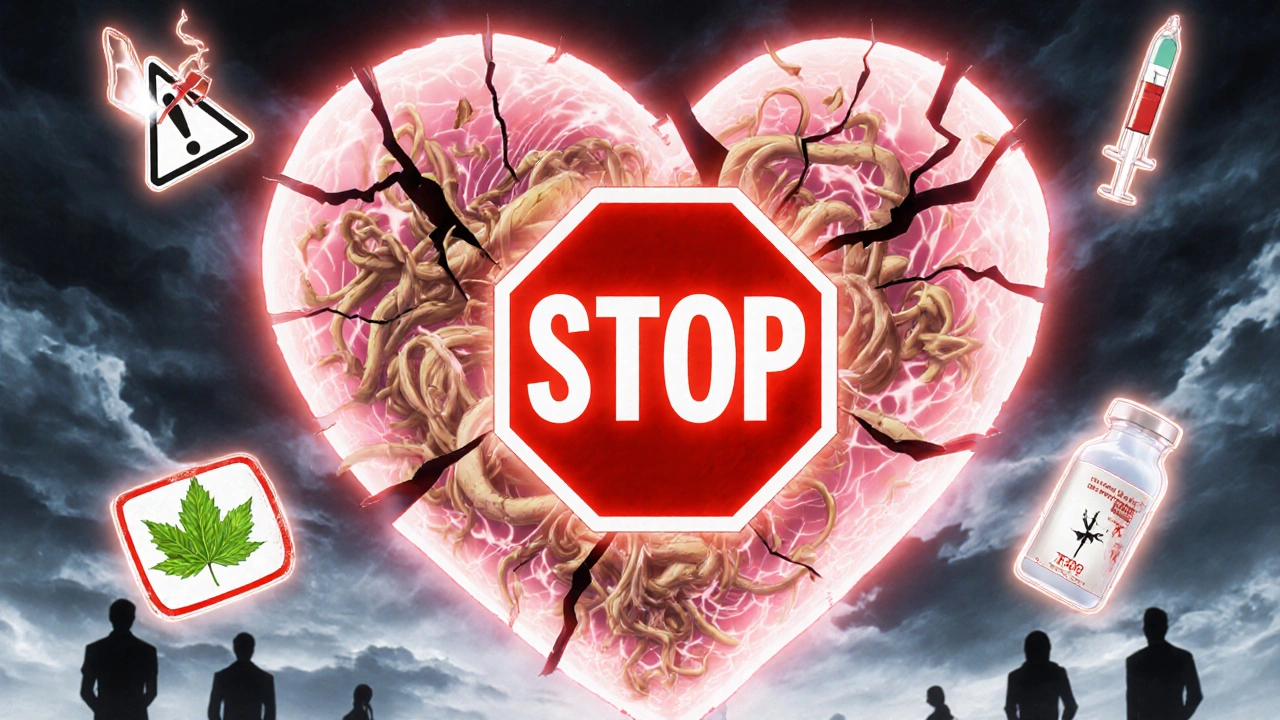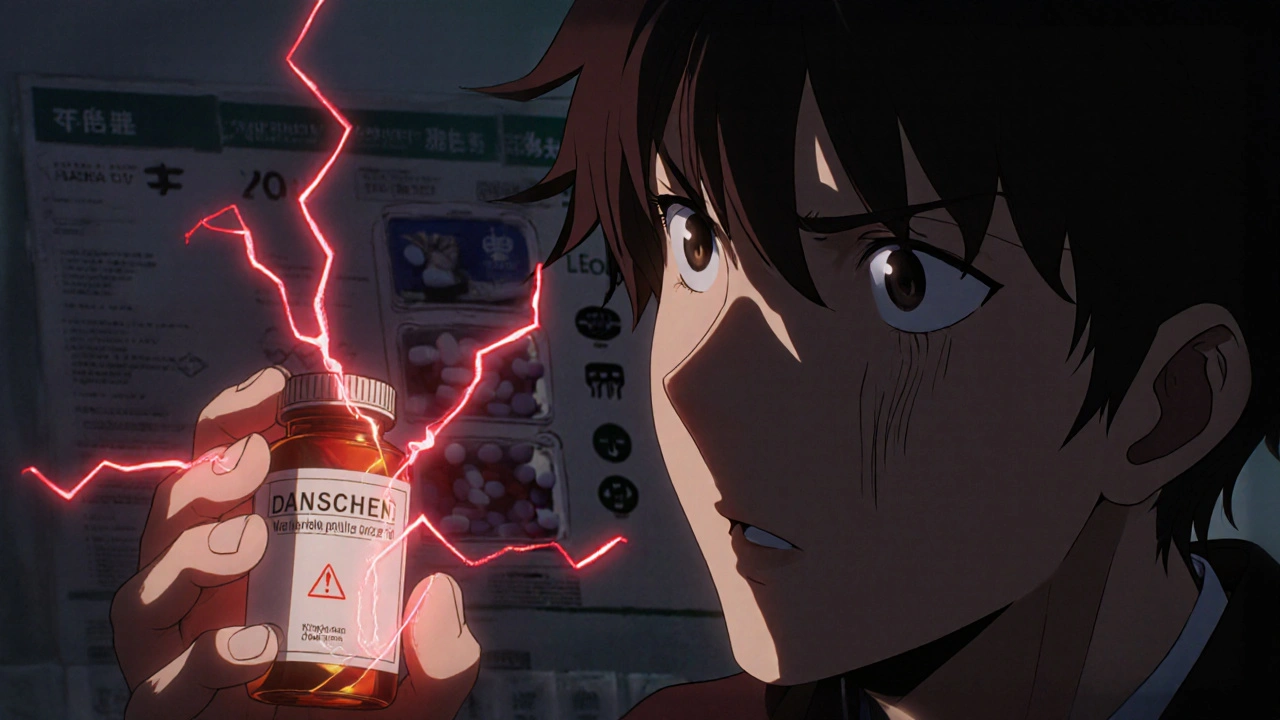Danshen Safety Checker
Check Your Medication Risk
If you're taking heart medication, Danshen can cause dangerous bleeding. Enter your medication to see if it's unsafe.
- Stop taking Danshen immediately
- Call your doctor or pharmacist right away
- Bring your medication bottle for identification
- Monitor for bleeding symptoms (nosebleeds, bruising, dark stools)
Why This Matters
Major medical organizations like the Cleveland Clinic and Mayo Clinic warn that Danshen interacts dangerously with all blood thinners.
Warning: This is not a medical test. Always consult your healthcare provider before stopping or changing medications.
Many people turn to herbal supplements like Danshen because they believe natural means safe. But when you’re on heart medication, that belief can be dangerous-sometimes deadly. Danshen, also known as Chinese sage or red sage, is a traditional herb used for centuries in China to support heart health. Today, it’s sold in health stores across the U.S., Australia, and Europe as a supplement for circulation, chest pain, or stroke prevention. But if you’re taking blood thinners like warfarin, rivaroxaban, or apixaban, mixing Danshen with your meds isn’t a harmless choice. It’s a ticking time bomb.
What Exactly Is Danshen?
Danshen comes from the root of Salvia miltiorrhiza, a plant used in Traditional Chinese Medicine since the Han Dynasty. Modern science confirms it contains powerful compounds like tanshinones and salvianolic acids. These aren’t just harmless plant extracts-they actively change how your body works. Danshen thins your blood, widens your heart’s arteries, and lowers blood pressure. That’s why it’s prescribed as an injection in China for heart attack recovery. But in the U.S. and Australia, it’s sold as an unregulated supplement. That means every pill, capsule, or tea you buy could have wildly different amounts of active ingredients. One batch might have 0.05% tanshinone; another might have 5.2%. There’s no standard. No safety net.
Why It’s Dangerous With Blood Thinners
If you’re on warfarin (Coumadin), rivaroxaban (Xarelto), or any other anticoagulant, your doctor carefully balances your dose to keep your blood from clotting too much or too little. Your INR-a blood test that measures clotting time-is your lifeline. Normal target range? Usually 2.0 to 3.0. Anything above 4.0 is risky. Above 6.0? That’s an emergency.
Danshen doesn’t just nudge your INR up. It slams it. Case after case in medical journals shows the same pattern: someone starts taking Danshen, their INR skyrockets, and they start bleeding internally. One man on warfarin for a mechanical heart valve saw his INR jump from 2.5 to over 8.4 after two weeks of Danshen. His hemoglobin dropped to 7.6 g/dL-signaling severe internal bleeding. Another woman’s INR rose from 2.0 to 5.5 after just a few days. She needed hospitalization. These aren’t rare outliers. A 2020 study in Taiwan found 17 such cases between 2015 and 2019. All involved Danshen and warfarin. All resulted in dangerous bleeding.
And it’s not just warfarin. Newer drugs like rivaroxaban are also at risk. Research from the NIH shows Danshen blocks the liver enzyme (CYP3A4 and CYP2C9) that breaks down these medications. That means your body can’t clear the drug. It builds up. Your blood gets thinner than intended. No one knows how much. No test tells you how much. And unlike warfarin, there’s no antidote for Danshen’s effects. If you bleed, doctors can’t reverse it. They can only try to stop the bleeding-often too late.
Real Stories, Real Consequences
Reddit threads are full of warnings from people who learned the hard way. One user wrote: “My INR went from 2.5 to 6.0 after my TCM practitioner prescribed Danshen with my Eliquis.” Another: “ER visit after taking Danshen with warfarin-never again.” These aren’t anecdotes from fringe forums. They mirror documented cases in peer-reviewed journals. A 48-year-old woman in the U.S. developed life-threatening bleeding after taking Danshen every other day for four weeks. She had no idea it could interact with her medication. Her doctor didn’t ask about herbs. She didn’t think to mention it.
That’s the bigger problem. Most people don’t tell their doctors about supplements. A 2019 JAMA study found only 28% of people taking herbal products disclosed them to their physicians. Why? They think it’s “just a herb.” They don’t see it as medicine. But Danshen isn’t chamomile tea. It’s a potent, pharmacologically active substance with documented, life-threatening interactions.

Who’s at Highest Risk?
If you’re taking any of these, you’re in the danger zone:
- Warfarin (Coumadin, Jantoven)
- Rivaroxaban (Xarelto)
- Apixaban (Eliquis)
- Dabigatran (Pradaxa)
- Aspirin or clopidogrel (Plavix)
- Any blood pressure medication, especially if you’re also on diuretics
People of Asian descent are especially likely to use Danshen-41.7% of Chinese immigrants in the U.S. reported regular use, according to a 2021 study. But the risk isn’t cultural. It’s biochemical. Your ethnicity doesn’t change how Danshen interacts with your liver enzymes. It just means you’re more likely to be using it without knowing the danger.
What Should You Do?
If you’re on heart medication and taking Danshen, stop immediately. Don’t wait. Don’t taper. Just quit. Then call your doctor or pharmacist. Tell them exactly what you’ve been taking-brand names, doses, how often. If you’re not sure what’s in your supplement, bring the bottle. Many products don’t even list Danshen correctly on the label. Some call it “red sage,” “Chinese sage,” or “Salvia miltiorrhiza.” Others hide it under “proprietary blend.”
If you’re not on blood thinners but thinking about starting Danshen for heart health, talk to your doctor first. There are safer, proven ways to support your heart: exercise, Mediterranean diet, statins if needed, blood pressure control. Danshen isn’t a magic cure. It’s a gamble with your life.
Even if your doctor says it’s “probably fine,” get a second opinion. The Cleveland Clinic, Mayo Clinic, WebMD, and the Natural Medicines Database all agree: Danshen and blood thinners = Major interaction. Do not take together. This isn’t a gray area. It’s a red flag.

What About Other Herbal Supplements?
Danshen isn’t the only one. Garlic, ginkgo, ginger, ginseng, and green tea extract can all interfere with blood thinners. But Danshen is uniquely dangerous because it hits multiple pathways at once: platelet inhibition, anticoagulation, and liver enzyme disruption. It’s not just one mechanism-it’s a cascade. And because it’s sold as a supplement, manufacturers aren’t required to test for interactions. The FDA has issued multiple warnings about unapproved Danshen products. The European Medicines Agency requires warning labels. In China, it’s a prescription drug. In the rest of the world? It’s a free-for-all.
Bottom Line: Natural Doesn’t Mean Safe
The American Heart Association says it plainly: “Natural does not mean safe.” Danshen is a powerful herbal medicine with real, measurable effects on your body. When mixed with heart medications, it can cause bleeding you won’t see coming-until it’s too late. No amount of “traditional use” or “ancient wisdom” changes the science. If you’re on anticoagulants, Danshen has no place in your regimen. Period.
If you’re considering Danshen for heart health, talk to your doctor about evidence-based alternatives. There are no shortcuts. Your heart doesn’t care if it’s herbal or pharmaceutical. It only cares if your blood is flowing safely.
Can I take Danshen if I’m not on blood thinners?
Even if you’re not on blood thinners, Danshen can lower your blood pressure and affect your heart rhythm. If you have heart disease, high blood pressure, or are taking any heart medication-including beta-blockers or calcium channel blockers-it’s still risky. There’s no safe dose established for general use, and the supplement industry doesn’t regulate potency. Unless you’re under the care of a qualified herbalist who coordinates with your doctor, it’s best avoided.
Is there a safe way to use Danshen with heart meds?
No. Major medical organizations-including the Cleveland Clinic, Mayo Clinic, and the Natural Medicines Database-state that combining Danshen with anticoagulants is contraindicated. There are no established guidelines for safe dosing, timing, or monitoring. Even if your INR is stable, Danshen can cause sudden, unpredictable spikes. The risk is not worth it.
How long does Danshen stay in your system?
There’s no clear answer. Danshen’s active compounds are metabolized by the liver and can linger for days, especially if you’ve been taking it regularly. The inhibition of liver enzymes can last even longer, affecting how your body processes other medications. If you’ve taken Danshen and need surgery or start a new heart medication, tell your doctor you used it-even if it was weeks ago.
Can I switch from warfarin to a newer blood thinner to avoid Danshen interactions?
Switching to rivaroxaban, apixaban, or dabigatran won’t solve the problem. Research shows Danshen interferes with the metabolism of these drugs too. In fact, studies suggest the interaction may be just as strong-or stronger-than with warfarin. The issue isn’t the type of blood thinner. It’s the herb itself. Avoid Danshen entirely if you’re on any anticoagulant.
What should I tell my doctor if I’ve been taking Danshen?
Be specific. Say: “I’ve been taking Danshen supplements for [X weeks/months] to help with my heart.” Mention the brand if you know it, or bring the bottle. Ask: “Could this interact with my current medications?” Request an INR check if you’re on warfarin. Don’t downplay it. Even if you think it’s “just a supplement,” your doctor needs to know-it could save your life.





Comments (9)